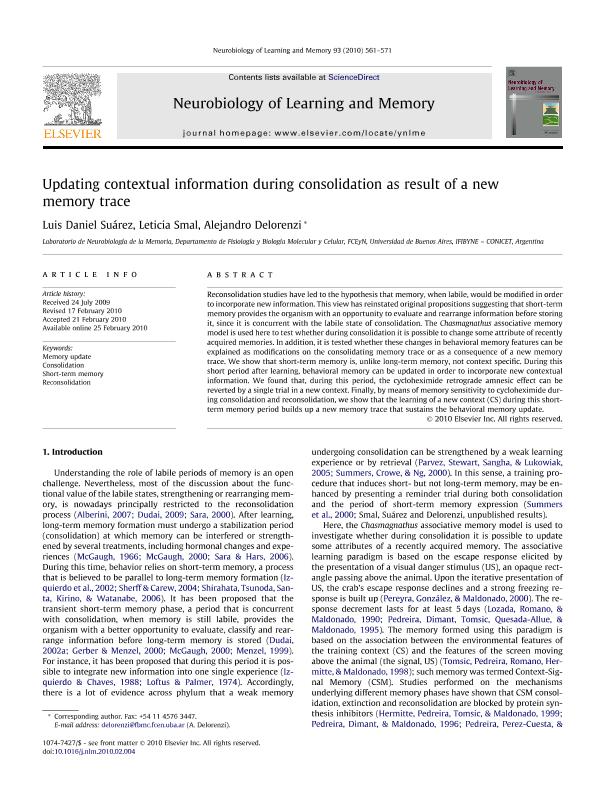Artículo
Updating contextual information during consolidation as result of a new memory trace
Fecha de publicación:
05/2010
Editorial:
Academic Press Inc Elsevier Science
Revista:
Neurobiology of Learning and Memory
ISSN:
1074-7427
Idioma:
Inglés
Tipo de recurso:
Artículo publicado
Clasificación temática:
Resumen
Reconsolidation studies have led to the hypothesis that memory, when labile, would be modified in order to incorporate new information. This view has reinstated original propositions suggesting that short-term memory provides the organism with an opportunity to evaluate and rearrange information before storing it, since it is concurrent with the labile state of consolidation. The Chasmagnathus associative memory model is used here to test whether during consolidation it is possible to change some attribute of recently acquired memories. In addition, it is tested whether these changes in behavioral memory features can be explained as modifications on the consolidating memory trace or as a consequence of a new memory trace. We show that short-term memory is, unlike long-term memory, not context specific. During this short period after learning, behavioral memory can be updated in order to incorporate new contextual information. We found that, during this period, the cycloheximide retrograde amnesic effect can be reverted by a single trial in a new context. Finally, by means of memory sensitivity to cycloheximide during consolidation and reconsolidation, we show that the learning of a new context (CS) during this short-term memory period builds up a new memory trace that sustains the behavioral memory update.
Palabras clave:
CONSOLIDATION
,
MEMORY UPDATE
,
RECONSOLIDATION
,
SHORT-TERM MEMORY
Archivos asociados
Licencia
Identificadores
Colecciones
Articulos(IFIBYNE)
Articulos de INST.DE FISIOL., BIOL.MOLECULAR Y NEUROCIENCIAS
Articulos de INST.DE FISIOL., BIOL.MOLECULAR Y NEUROCIENCIAS
Citación
Suárez, Luis Daniel; Smal, Leticia; Delorenzi, Alejandro; Updating contextual information during consolidation as result of a new memory trace; Academic Press Inc Elsevier Science; Neurobiology of Learning and Memory; 93; 4; 5-2010; 561-571
Compartir
Altmétricas




